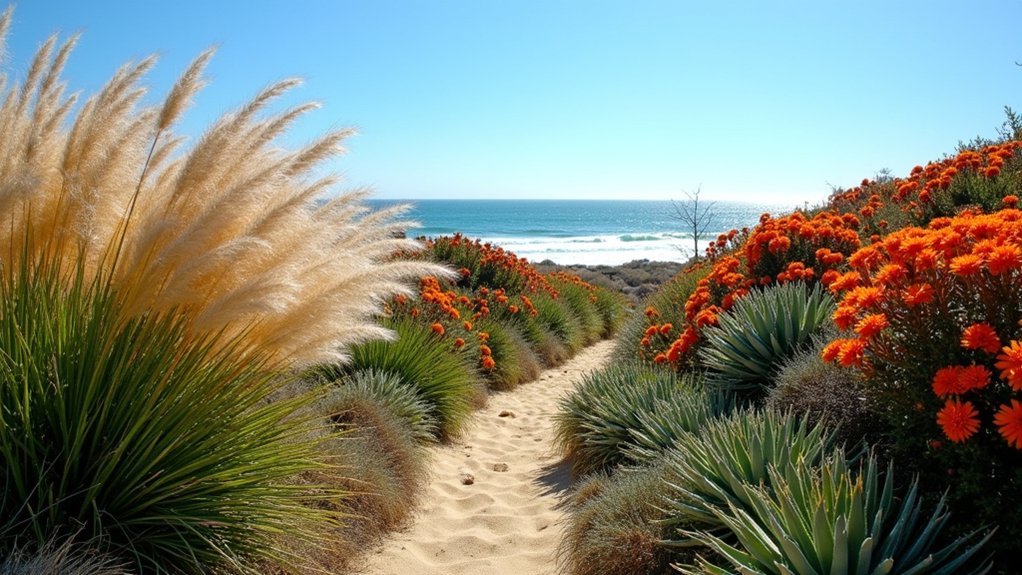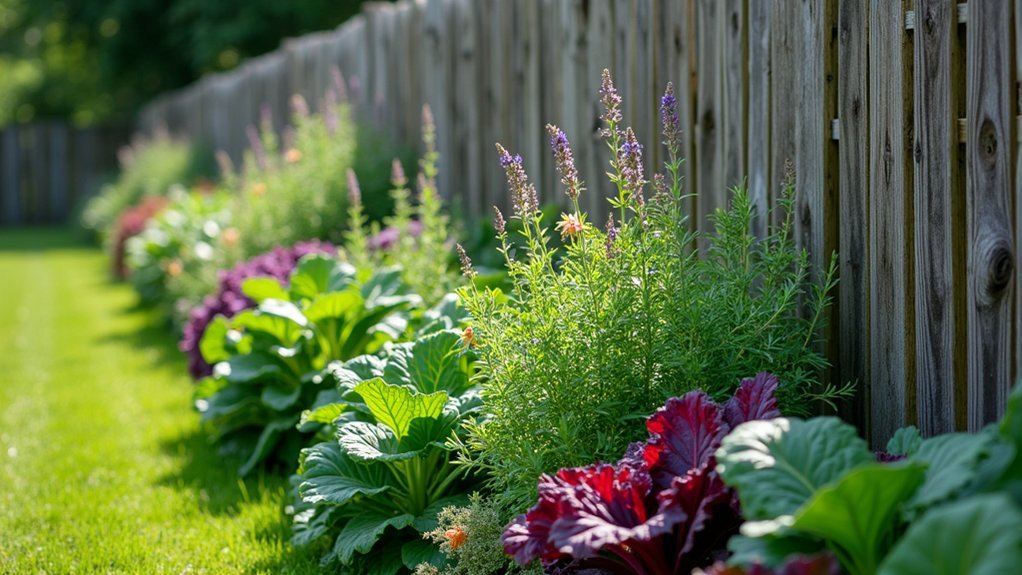When you're fencing a tropical property, you'll quickly discover that not all coconut timber posts are created equal. The constant cycle of moisture, heat, and humidity breaks down standard materials in months, not years. But the latest 2025 lineup of premium coconut timber options changes everything. These five posts have revolutionized durability standards with specialized treatments and density profiles that withstand the toughest tropical conditions. Ready to discover which ones will still be standing strong when others have long failed?
10 Pack Heavy Duty Metal U-Post Garden Fence Stakes (4 Feet)
Farmers and homesteaders looking for resilient fencing solutions will find these 10-pack metal U-posts a superior alternative to traditional wooden stakes. These four-foot powder-coated posts resist rust and water damage, extending their lifespan in harsh conditions.
You'll appreciate the no-dig installation—simply hammer until the anchor plate submerges. The adjustable hooks feature excellent welding craftsmanship, allowing you to customize tab tightness for enhanced stability.
While customers praise their quality and value, be aware that paint may scrape off during installation, and very high winds could cause bending. They're ideal for garden boundaries, temporary barriers, and pest protection applications.
Best For: Farmers, gardeners, homesteaders, and property owners seeking durable, easy-to-install fence posts for garden boundaries, temporary barriers, or livestock containment.
Pros:
- Heavy-duty metal construction with powder coating prevents rust and extends lifespan in harsh weather conditions
- No-dig installation saves time and effort as posts can be hammered directly into the ground
- Versatile design with adjustable hooks allows for customized fencing solutions and multiple applications
Cons:
- Paint may scrape off during installation, potentially reducing long-term rust protection
- May bend under extremely high wind conditions, requiring reinforcement in severe weather areas
- Four-foot height might be insufficient for containing larger animals or creating taller barriers
Fence Rescue Heavy Duty Steel Fence Post Repair Kit
When your coconut timber fence posts begin to lean, break, or decay, the Fence Rescue Heavy Duty Steel Fence Post Repair Kit offers a practical solution without requiring complete post replacement.
Made from 10-gauge S275 steel with a rust-resistant powder coating, this U-shaped anchor provides superior lateral support for weakened posts. At 30 inches long and 2 inches wide, it drives deep for maximum stability—ideal for tropical environments with high winds.
Installation is straightforward with the included wood screws. Users consistently praise its sturdiness and effectiveness, rating it 4.8/5 stars. Remember that each kit includes just one stake, so you'll need to purchase multiple units for larger projects.
Best For: Homeowners and DIY enthusiasts looking to repair and stabilize leaning, broken, or decaying wooden fence posts without the hassle and expense of complete post replacement.
Pros:
- Heavy-duty S275 10-gauge steel construction with U-shaped design provides superior lateral support and stability for weakened posts
- Easy installation process with included wood screws makes it accessible for users of all skill levels
- Powder-coated finish prevents rust and maintains aesthetic appeal while ensuring long-term durability
Cons:
- Each kit only includes one stake, requiring multiple purchases for larger fence repair projects
- Specifically designed for wooden posts set in concrete, limiting versatility for other post types
- At 30 inches long, may require significant clearance around the fence post for proper installation
VASGOR Sturdy Duty Metal U-Post for Garden Fencing (7 Feet, 10 Pack)
Homeowners seeking lightweight fencing support might consider VASGOR's metal U-posts as an alternative to coconut timber. These 7-foot posts feature 13-gauge steel construction with a green powder coating to resist rust.
While marketed as "sturdy duty," user feedback suggests they're better suited for lightweight applications like supporting young saplings or garden trellises. The posts include tabs for easy fence attachment and can be spaced 5-8 feet apart.
Before purchasing, weigh your needs carefully. If you're planning robust fencing in tropical environments, you'll likely need something more substantial than these light-duty supports that some users report bend under pressure.
Best For: Homeowners needing lightweight garden supports for applications like trellises, small plant cages, or temporary fencing in low-stress environments.
Pros:
- Easy installation with pre-designed tabs for anchoring rolled fence products
- Rust-resistant green powder coating enhances outdoor durability
- Versatile usage for lightweight applications including signs, small garden fences, and supporting young plants
Cons:
- Less durable than actual T-posts with users reporting bending under moderate pressure
- 13-gauge (1.8mm) steel is classified as light-duty, unsuitable for robust fencing needs
- May not provide adequate support in regions with harsh weather conditions or for containing animals
XYADA Sturdy Metal Fence Posts (6 Feet, Pack of 10)
Metal fence posts offer a practical alternative to traditional timber options, and XYADA's 6-foot sturdy posts come in a convenient pack of ten for larger projects. These high-quality metal posts feature convenient tabs for attaching chicken wire or light-duty fencing to protect your garden from small animals.
Installation is straightforward—simply drive the post into the ground until the anchor plate is submerged. While most customers praise their durability across multiple seasons, some report the posts being lighter than expected. If you're seeking versatility, these multipurpose posts also work well for mounting signs or creating garden boundaries.
Best For: Homeowners and gardeners looking for an affordable, easy-to-install fencing solution to protect plants from small animals or to mount signs on their property.
Pros:
- Quick and simple installation process requiring minimal tools or expertise
- Versatile design with tabs that easily attach to chicken wire or light-duty fencing
- Durable metal construction that holds up well across multiple seasons for most users
Cons:
- Some customers report the posts being lighter and less heavy-duty than advertised
- May bend under pressure when used for more demanding applications
- Inconsistent quality control with mixed customer experiences regarding durability
Sunnyglade 42-Inch Fiberglass Electric Fence Posts with Metal Loops
While coconut timber offers excellent sustainability credentials, fiberglass options like the Sunnyglade 42-Inch Electric Fence Posts provide distinct advantages for those seeking versatile temporary fencing solutions. Made from durable Glass Fibre, these black posts blend seamlessly into landscapes while withstanding diverse weather conditions.
You'll appreciate the sharp tip design that enables easy installation in most soils. With 100 metal loops included, you can create customized barriers for gardens, events, or construction zones. Though some customers report shipping issues with missing loops, many praise their effectiveness at deterring deer and goats.
These posts particularly excel when you need quick-deploy perimeter solutions that don't require permanent installation.
Best For: Homeowners and event planners who need temporary, easy-to-install fencing solutions that are weather-resistant and visually unobtrusive.
Pros:
- Made from durable Glass Fibre material that withstands various weather conditions without breaking or bending
- Includes 100 metal loops for versatile customization and creating continuous fence barriers
- Features a sharp tip design for easy installation in most soil types
Cons:
- Some customers report receiving packages with missing metal loops
- Average customer rating of 3.4/5 suggests mixed experiences with the product
- May require additional tools (steel drill) for installation in hard or frozen ground
Factors to Consider When Choosing the Most Durable Coconut Timber Fence Posts for Tropical Settings
When selecting coconut timber fence posts for tropical settings, you'll need to evaluate their weather resistance properties and apply appropriate insect repellent treatments to prevent premature degradation. Your installation depth should account for both the post's height and the local soil acidity, as acidic soils can accelerate decomposition at the ground line. Effective preservation techniques, such as hot-oil treatment or copper-based solutions, will greatly extend your posts' service life in challenging tropical environments.
Weather Resistance Properties
Since tropical regions present unique environmental challenges, understanding coconut timber's weather resistance is essential for selecting durable fence posts. You'll benefit from coconut timber's natural moisture resistance, which considerably prevents rot and decay in humid conditions common to tropical environments.
The high density of quality coconut fence posts enables them to withstand extreme weather patterns, including torrential downpours and powerful winds that frequently occur in tropical regions. The timber's natural oil content provides built-in protection against destructive fungi and pests that thrive in warm, moist climates.
For maximum longevity, look for posts with proper UV-resistant treatments and finishes. The wood's low thermal expansion rate is particularly valuable as it helps maintain structural integrity despite the dramatic temperature fluctuations typical of tropical settings.
Insect Repellent Treatments
Because tropical regions harbor numerous wood-boring insects that can rapidly deteriorate untreated timber, effective insect repellent treatments are essential for coconut fence post durability. You'll want to prioritize posts treated with borate-based solutions, which penetrate deeply into wood fibers for long-lasting protection while remaining environmentally safe.
Properly treated coconut timber can last twice as long as untreated versions, making the initial investment worthwhile. Consider posts treated with natural alternatives like neem or cedarwood oil if you prefer biodegradable options that won't harm your ecosystem.
When shopping for coconut fence posts, check that treatments have been professionally applied and certified. Regular maintenance with these repellents will preserve both structural integrity and appearance, reducing how often you'll need to replace posts in your tropical setting.
Installation Depth Requirements
Three critical factors determine the ideal installation depth for coconut timber fence posts in tropical environments. First, you'll need to bury at least 1/3 of your post's total height underground to guarantee stability against tropical downpours and soil erosion.
For most applications, dig 2-3 feet deep holes for your coconut timber posts. This depth provides sufficient anchoring against strong winds and environmental stresses common in tropical settings.
Your soil type matters considerably. If you're dealing with sandy soil, you'll need to install posts deeper than you would in clay or loamy soil to achieve the same stability.
Don't overlook local building codes. Many tropical regions have specific depth requirements for fence installations that you must follow for compliance and long-term durability.
Soil Acidity Considerations
Soil composition extends beyond mere depth considerations when installing coconut timber fence posts. The acidity level of your soil can dramatically impact the longevity of your fence investment, with ideal pH ranging between 6.0 and 7.0.
While coconut timber naturally resists some fungal attacks, highly acidic soils accelerate decay and degrade even the most durable posts. You'll want to test your soil before installation, as this simple step can prevent premature replacement costs.
If you discover your soil pH falls below 6.0, consider applying lime to neutralize acidity. This adjustment creates a more favorable environment for your coconut timber fence posts. In tropical settings where moisture is abundant, managing soil acidity becomes even more essential to maximize the service life of your installation.
Preservation Techniques
While natural coconut timber offers impressive durability, applying proper preservation techniques greatly extends its lifespan in tropical settings.
For maximum protection, consider pressure treatment methods that force preservatives deep into the wood's cellular structure, enhancing resistance to decay and insect damage. Coconut's natural lauric acid provides inherent rot resistance, but you'll want to augment this with a quality sealant that blocks moisture and UV damage.
Opt for eco-friendly preservatives like borates when treating your posts, especially if you're environmentally conscious. These non-toxic solutions effectively protect the timber without harmful environmental impacts.
Remember that even the most durable posts require maintenance. Plan for regular cleaning and resealing to maintain integrity. This ongoing care is critical to ensuring your coconut timber fence posts remain strong and attractive in harsh tropical conditions.
Frequently Asked Questions
How Long Can Coconut Timber Fence Posts Last in Tropical Climates?
Your coconut timber fence posts can last 15-25 years in tropical climates. Their durability depends on proper treatment, installation quality, and local humidity levels. You'll get maximum lifespan with preservative-treated varieties.
Are Coconut Timber Fence Posts Resistant to Termites?
Coconut timber fence posts have natural resistance to termites, but it's not complete. You'll need to treat them with preservatives for maximum protection, especially in termite-heavy tropical areas where they're commonly used.
What Maintenance Is Required for Coconut Timber Fencing?
You'll need to treat coconut timber fencing annually with sealant or natural oil. Remove debris, check for damage, and apply borax solution to deter termites. Regular cleaning and addressing splits will extend its lifespan.
Can Coconut Timber Posts Be Treated With Eco-Friendly Preservatives?
Yes, you can treat coconut timber posts with eco-friendly preservatives like beeswax, linseed oil, or borax solutions. These natural options protect against moisture and insects while maintaining the wood's sustainability credentials.
How Does Coconut Timber Compare to Traditional Hardwoods for Fencing?
Coconut timber offers comparable durability to mid-range hardwoods but with faster growth rates. You'll find it's more resistant to insects and salt spray, though it's generally less dense than premium hardwoods like teak.





Leave a Reply